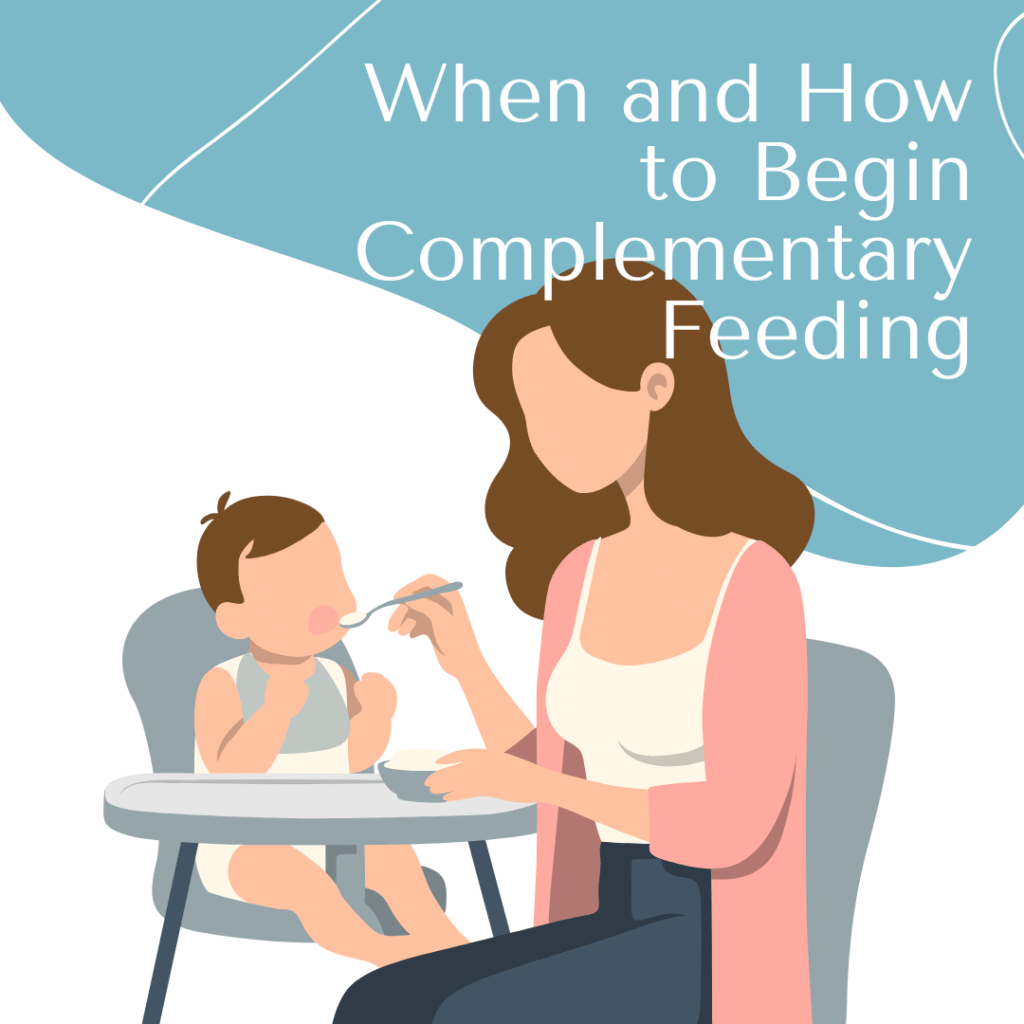Starting Solids: When and How to Begin Complementary Feeding

Introducing solids is an exciting milestone for parents and babies alike. It’s the start of your child’s lifelong relationship with food. Here’s how to make this transition smooth and enjoyable. When to Start: Most babies are ready for complementary feeding around 6 months of age. Look for these readiness signs: Good head and neck control Sitting with support Interest in food (watching you eat, reaching for food) First Foods to Offer: Start with simple, easily digestible foods: Single-grain cereals (rice, ragi) Pureed fruits (banana, apple, pear) Pureed vegetables (carrot, pumpkin, sweet potato) How to Introduce New Foods: Introduce one new food at a time Wait 3 days before introducing another new food to monitor for allergies Begin with small quantities—1-2 spoonfuls once a day Gradually increase variety and quantity over time Foods to Avoid in the First Year: Salt and sugar Honey (risk of botulism) Cow’s milk as the main drink Hard foods that can cause choking (nuts, whole grapes) Helpful Tips: Let your baby explore textures and tastes at their own pace Be patient—it’s normal for babies to take time to accept new foods Keep mealtimes positive and stress-free Final Thoughts Complementary feeding is about more than nutrition—it’s about fostering a healthy relationship with food. Take it slow, enjoy the journey, and consult your pediatrician if you have any concerns. Newsletter Sign up our newsletter to get update information, news and free insight. Popular Categories Mental Health Patient Stories Wellness and Lifestyle Medical Services General Health Health Tips and Advice Latest Post
Screen Time for Kids: How Much Is Too Much?

Screens have become an inseparable part of our lives, and it’s natural for parents to wonder how much screen time is safe for their children. As a pediatrician, I often advise families on finding a healthy balance. Pediatrician-Approved Guidelines: 0-2 years: Ideally no screen time, except video chats with family and friends. 2-5 years: Limit to a maximum of 1 hour per day. Prioritize high-quality, educational content and co-view whenever possible. 6 years and above: Set consistent limits. Balance screen time with physical activity, sleep, and offline play. Risks of Excessive Screen Time: Delayed language and cognitive development Behavioral problems and attention issues Sleep disturbances Obesity and poor physical health Tips for Managing Screen Time: Be a role model by limiting your own screen time Establish screen-free zones (dining table, bedrooms) Encourage outdoor play and hobbies Engage in screen-free family activities Conclusion It’s not just about ‘how much’ screen time kids have—it’s about ensuring the content is positive and that screens don’t replace critical activities like sleep, exercise, and face-to-face interaction. Newsletter Sign up our newsletter to get update information, news and free insight. Popular Categories Mental Health Patient Stories Wellness and Lifestyle Medical Services General Health Health Tips and Advice Latest Post
Neonatal Jaundice in Newborns: What Every Parent Should Know

It can be alarming to see your newborn’s skin turn yellow. But don’t panic—neonatal jaundice is very common and often harmless. Understanding when it’s normal and when it’s a cause for concern can help you stay calm and informed. What Is Neonatal Jaundice? Jaundice occurs when there is an excess of bilirubin in the blood. Bilirubin is a yellow pigment produced when red blood cells break down. In most newborns, the liver is still maturing and takes a few days to process and eliminate bilirubin effectively. When Does It Appear? Neonatal jaundice usually appears between Day 2 and Day 5 after birth and typically resolves within 1 to 2 weeks. When Should You Worry? While mild jaundice is normal, the following signs should prompt you to contact your pediatrician: Yellowing within the first 24 hours of life Rapid spreading of yellow color to arms, legs, or entire body Poor feeding or excessive sleepiness Deep yellow coloration of the whites of the eyes Jaundice persisting beyond 2 weeks of age Treatment Options Mild Jaundice: Often resolves naturally with frequent feeding, which helps flush bilirubin out through urine and stool. Some sunlight exposure (morning sun) may also help. Moderate to Severe Jaundice: May require phototherapy, where the baby is placed under a special blue light that helps break down bilirubin. Final Thoughts Always consult your pediatrician for any concerns about jaundice. Early diagnosis ensures prompt and effective treatment. 4. Mental Prep for Parents Parenting is a journey filled with joy and challenges. Preparing mentally can be as important as physical preparation: Accept help from family and friends Rest whenever possible Understand that feeling nervous or overwhelmed is normal Remember, a little planning goes a long way. And if you’re unsure about anything, don’t hesitate to speak to your pediatrician—we’re here to help! Newsletter Sign up our newsletter to get update information, news and free insight. Popular Categories Mental Health Patient Stories Wellness and Lifestyle Medical Services General Health Health Tips and Advice Latest Post
How to Prepare for Your Newborn: The Ultimate Checklist for Parents

Preparing for the arrival of your baby is one of the most exciting moments of parenthood. But it can also feel overwhelming. As a pediatrician and neonatologist, I’ve seen how a little preparation can make a big difference in your newborn’s first few days. Whether you’re a first-time parent or experienced, this guide will help you cover all the essentials. 1. Pack Your Hospital Bag by Week 36 A well-packed hospital bag ensures that you’re ready for delivery and can focus on your baby instead of last-minute packing. Here’s what you should include: For Mom: ID proof, insurance papers Comfortable clothes for after delivery Nursing bra Sanitary pads Toiletries Snacks and water bottle Phone charger For Baby: Soft cotton onesies Mittens, cap, and socks Diapers and wipes Soft baby blanket Burp cloths Having everything ready by week 36 means one less thing to stress about when labor begins. 2. Set Up a Safe Sleep Space Your baby’s crib or bassinet should be prepared before you come home from the hospital. Remember: Use a firm mattress with a fitted sheet Keep the crib free of pillows, toys, and loose bedding Always place your baby on their back to sleep to reduce the risk of SIDS (Sudden Infant Death Syndrome) 3. Plan for Emergency Contacts Keep important contact numbers saved and accessible: Your pediatrician Nearest hospital with NICU (Neonatal Intensive Care Unit) Emergency family contacts Creating a simple list on your phone or fridge can be a lifesaver. 4. Mental Prep for Parents Parenting is a journey filled with joy and challenges. Preparing mentally can be as important as physical preparation: Accept help from family and friends Rest whenever possible Understand that feeling nervous or overwhelmed is normal Remember, a little planning goes a long way. And if you’re unsure about anything, don’t hesitate to speak to your pediatrician—we’re here to help! Newsletter Sign up our newsletter to get update information, news and free insight. Popular Categories Mental Health Patient Stories Wellness and Lifestyle Medical Services General Health Health Tips and Advice Latest Post
